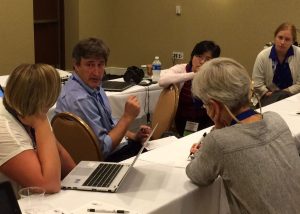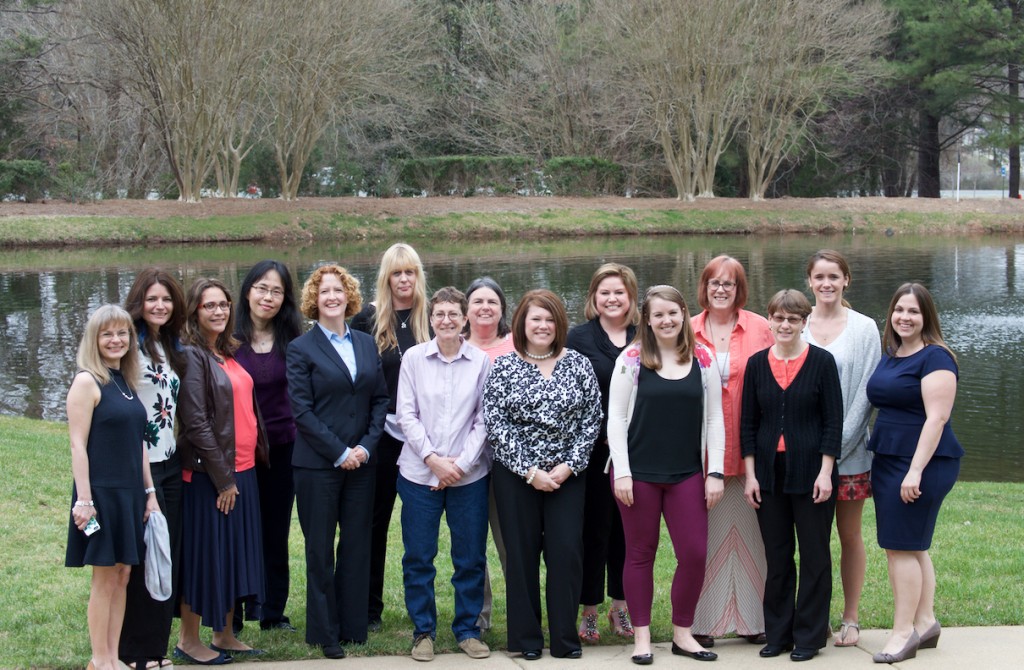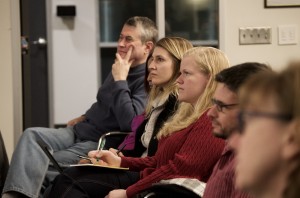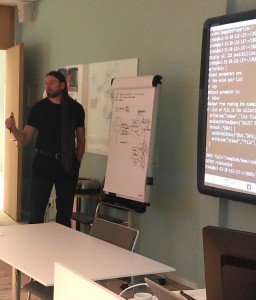 DataBridge, a National Science Foundation-funded project to make research data more discoverable and usable by a wide community of scientists, has the green light to expand its work into the neuroscience community, thanks to a new NSF EAGER award.
DataBridge, a National Science Foundation-funded project to make research data more discoverable and usable by a wide community of scientists, has the green light to expand its work into the neuroscience community, thanks to a new NSF EAGER award.
DataBridge tackles the problem of ‘dark data’
Leading the charge in biomedical visualization
 Biomedical informatics is one of the hottest data science research fields, with scientists publishing hundreds of research papers every year that could impact how patients and doctors access and interact with medical information and the effectiveness of medical treatments.
Biomedical informatics is one of the hottest data science research fields, with scientists publishing hundreds of research papers every year that could impact how patients and doctors access and interact with medical information and the effectiveness of medical treatments.
Why Data Commons? Because scientists want to focus on science, not infrastructure

ESIP meeting participants discuss the challenges of a Data Commons at their recent summer meeting in Durham, NC.
After more than 25 years as a science communicator, I’ve come to recognize the things that all scientists, regardless of their disciplines, yearn for. It’s not an endless stream of funding or appreciation from the public for their work (although both would be nice). Read more…
Introducing the Women of RENCI
As Women’s History Month draws to a close, RENCI acknowledges the daily hard work of each of its female employees. The research strides occurring at RENCI would not be possible without our female researchers, project coordinators, administrators, and communicators.

From left to right: Asia Mieczkowska, Jennifer Resnick, Claris Castillo, Hong Yi, Lea Shanley, Caryn Best, Lisa Stillwell, Margaret Wesley, Kristi Andrews, Laura Capps Hill, Rebekah Sturgess, Karen Green, Dawn Carsey, Annie Goessling, and Stephanie Suber
Recently, the RENCI communications team rounded up as many “Women of RENCI” as possible for a group photo and to learn more about how they contribute to the organization. The list below (and the photo) summarize the information gathered on that day. Read more…
RENCI CTO speaks to high school students on the future of computer science
The next generation of potential computer scientists are making their way to K-12 classrooms each day, but are these young minds being exposed to the fundamentals of computer science? According to Code.org, only one in four American high schools offer computer science courses, and few of those schools allow the course to count toward graduation.
To counteract these statistics, some computer scientists are working harder to share their knowledge and experiences from the field. RENCI’s Director of Informatics and Chief Technology Officer Charles Schmitt, PhD, joined the cause recently when he visited the North Carolina School of Science and Math (NCSSM) to speak to a group of students about computer science. Read more…
Research Triangle Analysts at RENCI: Topological Data Analysis
Research Triangle Analysts met at RENCI for their first monthly meeting of the new year on January 19. Research Triangle Analysts meet at RENCI every third month and elsewhere around the Triangle during other months. The group, a 501(c)(3) non-profit and all-volunteer organization, promotes the advancement of data science throughout the Triangle’s collaborative communities of analysts, mathematicians, statisticians, and scientists.
Hamza Ghadyali, a PhD candidate in mathematics at Duke University, featured as the speaker for the meeting. Ghadyali develops new topological data analysts (TDA) tools, particularly for the analysis of electroencephalogram (EEG) data. Topology is the mathematical study of shape. TDA tools analyze large, noisy, complex datasets from disciplines such as, but not limited to, oncology, astronomy, meteorology, and neuroscience. Analysis of the shapes and changes in shape represented by data yield information about the data. Read more…
Crossing the pond in the name of better data management
The iRODS data management platform and the iRODS Consortium that works to sustain it are making waves well beyond their home base in Chapel Hill, NC.
This week, three of the smart, savvy people behind iRODS and the Consortium (iRODS originator Reagan Moore, Consortium Executive Director Dan Bedard, and Chief Technologist Jason Coposky) traveled to France, the United Kingdom, and the Netherlands to talk about the benefits of iRODS as a data management solution for large distributed research projects, to provide training for those interested in becoming iRODS power users, and generally to evangelize about software that is now being used far and wide in Europe, the U.S., Asia, South America, Australia, and South Africa. Read more…
Coffee and Viz series brings teaching in a Social Computing Room to life
Professors at NC State University and UNC-Chapel Hill have access to a tool that can bring both excitement and exploration into their curriculum – the Social Computing Room (SCR). While the resource is available on both campuses, educators can be unsure about how it effectively fits into their course plans.
NC State’s Coffee and Viz series hopes to provide ideas for instructors of all disciplines by highlighting those already using SCRs and other visualization spaces and by providing speakers with novel ideas for the use of visualization in education and research.
DataNet presentations lead to invigorating discussion at ESA annual meeting
 DataNet Tools and Services was the topic of a session at the recent Ecological Society of
DataNet Tools and Services was the topic of a session at the recent Ecological Society of
America Annual Meeting, held last month in Baltimore.
Chris Lenhardt and Mike Conway presented in the session representing the UNC Chapel Hill-based DataNet Federation Consortium (DFC). Chris is lead of the DFC Facilities and Operations team and is active in RENCI’s environmental sciences group; Mike is a senior developer with DFC.
Organized by Amber Budden of the DataONE DataNet project, the session used the IGNITE format: a series of 5-minute, 20-slide talks followed by Q & A. The fast-paced IGNITE talks present forward-looking, unconventional, and/or controversial ideas to spur the audience into questioning their usual assumptions and thinking creatively about the topic. Both of the DFC IGNITE talks challenged the audience to consider how a data management system can provide tools and services for scientists that go beyond simply storing, indexing discovering, and accessing data files. Read more…
Three keys to work-life balance
Last week, I was asked to speak to young professionals about work-life balance, so I have been pondering this topic a lot. How do you juggle both a full-time, demanding and exacting career and the often-contradictory demands of raising little human beings to become productive members of society? To be honest, I think the “secret” is that all of us are just winging it, really, and we are creating and maintaining balance as we go – even if it doesn’t appear that way to others from the outside. Parenting and careers are all about change. Just when you think you have achieved the perfect balance, something changes – your child starts potty training, enters puberty, adjusts to a new school, or gets chosen for a school team. You earn a promotion and gain new responsibilities, move offices (which affects your commute), or start a new job. Your spouse has to travel more or has a change in health condition. Older family members need care and help in a way they haven’t before.




